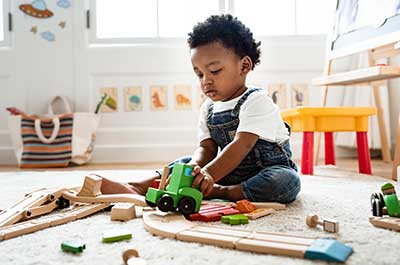Milestones like crawling and walking are a big deal when you’re a parent. But what about the smaller achievements, or “inchstones,” your child experiences? These can be just as exciting as significant milestones, especially if you have a child with special needs.
Shoshana Gordon, D.O., a pediatrician at Henry Ford Health, talks about the benefits of noticing—and sometimes celebrating—inchstones.
What Are Inchstones?
They say a journey of a thousand miles begins with a single step. And while a child’s milestones can be reasons to celebrate, they don’t acknowledge all the mini-victories along the way. Milestones can also feel like a million miles away if your child has developmental differences.
Enter inchstones, a way to track your child’s progress and accomplishments without the weight of major milestones. “Inchstones are different for every child because every child has unique abilities,” says Dr. Gordon. “For one child, looking at mom when she calls their name could be an inchstone. For another child, it could be grasping a bite of food and feeding themselves.”
You can identify inchstones by being present with your child and noticing as they do new things. Maybe your 2-year-old put their toys away without being asked. Or perhaps your 4-year-old put on her shoes.
“An inchstone is a small thing your child has never done before that speaks to their development,” says Dr. Gordon. “You know your child best, so you usually know an inchstone when you see one. For example, a child saying ‘mama’ at age 1 is common for a developmentally typical child. But if your child has speech delays, this could be a major inchstone worth recognizing.”
How Do You Celebrate Inchstones?
Choosing to celebrate inchstones is up to each family, but don’t feel pressure to have a party for every step forward. Sometimes, celebrating an inchstone is as simple as pointing it out and praising the progress.
“If you know your child worked hard to achieve an inchstone, tell them you noticed it, and offer a smile and hug,” says Dr. Gordon. “You can also ask your child, ‘How do you feel?’ to help them notice their positive feelings about their accomplishment.”
If you have a child with developmental differences, some inchstones might be worth celebrating. “Cupcakes might be appropriate for a child with physical differences who rolls over or sits up on his own,” says Dr. Gordon. “But for a child with developmentally typical abilities, a party for these inchstones is likely too much. It depends on your unique situation.”

Need A Pediatrician?
Using Inchstones to Encourage Your Child
Recognizing your child’s inchstones isn’t just about celebrations. This tactic can also help kids appreciate the value of hard work and effort. Use these mini-accomplishments as teaching moments to guide them through more challenging responsibilities as they grow.
“Inchstones can show your child that we accomplish big things through many smaller steps,” says Dr. Gordon. “This lesson applies to a school-aged child studying for a test or a young adult tackling an important work project. They learn that when they feel overwhelmed by a big task, they can break it down into inchstones that move toward the goal.”
Don’t Compare Your Child to Others
It’s easy to get overwhelmed or stressed about milestones and inchstones. Parents on social media may announce their child’s achievements, leaving you to wonder if and when your child will meet those marks. Dr. Gordon advises against this comparison game.
“Every child is unique, so they will meet milestones and inchstones at different ages,” says Dr. Gordon. “The age when your child does a certain thing has nothing to do with their intelligence or how successful they will be.”
So be honest when your child’s provider asks about your child’s developmental progress. It’s not a test your child needs to pass—it’s a way to help your child get the support they need.
“Most of the time, we can offer reassurance that your child will meet the milestone soon,” says Dr. Gordon. “And if there’s a developmental delay, we can provide early intervention to help your child grow, develop and succeed.”



